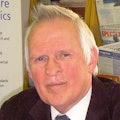Mae ein hymchwil yn canolbwyntio ar synthesis, nodweddu a modelu deunyddiau cwantwm, cyfansoddion swyddogaethol ac adeileddau deunydd datblygedig sydd â diddordebau penodol mewn cymwysiadau magnetig, synhwyro, cynaeafu ynni a biofeddygol.
Mae'r meysydd ymchwil craidd yn cynnwys:
- Priodweddau magnetig a chymhwyso duroedd trydanol
- Synwyryddion a systemau magnetig ar gyfer cymwysiadau meddygol
- Anffurfiad a lludded mewn bioddeunyddiau a nanogyfansoddion
- Deunyddiau a chyfansoddion ceramig swyddogaethol ar sail graffen
- Deunyddiau a dyfeisiau thermodrydanol ar gyfer cynaeafu ynni
- Celloedd solar wedi'u prosesu mewn hydoddiant a systemau hybrid crynodedig
- Nano-opteg lled-ddargludyddion a ffotoneg gwantwm
Ymchwil
Y Labordy Thermodrydanol a Ffotofoltäig
Mae'r gweithgaredd ymchwil hwn yn ymwneud â deunyddiau a dyfeisiau thermodrydanol megis y rhai a ddefnyddir i gynaeafu ynni trwy adfer gwres gwastraff o brosesau egsôst moduron ac oeri Peltier ar gyfer cymwysiadau amrywiol, gan gynnwys systemau dihalennu dŵr. Yn 2012 sefydlwyd llinellau ymchwil newydd ar sail amrywiol dechnolegau ffotofoltäig a generaduron thermomagnetig a'u cymhwysiad gyda modiwlau thermodrydanol. Mae ymchwil bellach yn cynnwys dyddodi deunyddiau ffilm tenau swyddogaethol gan Ddyddodi Laser â Phwls (PLD) a sgrin-brintio i'w gymhwyso mewn celloedd solar â sensitifrwydd lliw (DSC). Mae'r ymchwil hon yn ymwneud â pharatoi, nodweddu ac optimeiddio ffilmiau tenau ocsid lled-ddargludyddion. Mae'r system PLD yn gyfleuster datblygedig sy'n galluogi paratoi ystod eang o ffilmiau tenau mewn modd rheoledig iawn. Mae'r deunyddiau wedi’u dyddodi’n amrywio o led-ddargludyddion aml-gydran ac aloiau i fetelau pur. Gellir defnyddio'r cyfarpar ar gyfer Ymchwil a Datblygu, cynhyrchu peilot, a galluoedd cynhyrchu llawn ar gyfer amrywiaeth o gymwysiadau gan ddibynnu ar y galw a chynhyrchiant.
Mae ymchwil bellach yn cynnwys efelychiad cyfrifiadurol thermodrydaneg (TE) gan gynnwys modelu elfennau cyfyngedig o fodiwlau TE. Cynhelir y gwaith hwn ar y cyd â chaffael data arbrofol i ddatblygu dealltwriaeth drylwyr o briodweddau cludiant lled-ddargludyddion, ffiseg dyfeisiau, llunio a nodweddu. Mae ymateb AC elfennau TE ar gyfer sbectrosgopeg rhwystriant hefyd wedi'i gyfrifo a all ddarparu mesur cyflym o briodweddau deunydd.
Magneteg ynni a phŵer
Mae ymchwil yng Nghanolfan Magneteg Wolfson yn canolbwyntio ar sawl maes sy'n gysylltiedig â chynhyrchu, nodweddu a chymhwyso deunyddiau magnetig.
Mae gan y Ganolfan hanes rhyngwladol sefydledig mewn ymchwil ar agweddau ar ddeunyddiau magnetig meddal a chynhelir prosiectau ymchwil ac ymgynghori ar gyfer sefydliadau sy'n amrywio o gwmnïau rhyngwladol arloesol i gwmnïau bach lleol.
Mae colledion ynni sy'n gysylltiedig â systemau magnetig pŵer yn cyfrif am gymaint â 10% o drydan a gynhyrchir yn y DU, a dim ond arbediad o 3% ar golledion magnetig sy'n cyfateb i 3-4 miliwn tunnell o allyriadau carbon deuocsid y flwyddyn.
Prosiectau
Mae'r grŵp yn cymryd rhan yn y prosiectau canlynol:
Prosiect GLOBASOL FP7 sy'n anelu at integreiddio thermodrydaneg â chelloedd solar, gan rannu'r ymbelydredd sy'n dod i mewn yn ôl tonfeddi, fel bod tonfeddi byr yn cael eu trosi gan y gell solar a thonfeddi hir gan y generadur TE. Ymchwilir hefyd i lunio a nodweddu deunydd thermodrydanol nanostrwythuredig a swmp (Bi2Te3) i asesu gweithrediad y fath ddeunydd ar dymheredd ystafell. Mae gan brosiect Globasol bartneriaid, sef UNIPMN (Yr Eidal) sy'n arwain y prosiect, Sefydliad Fraunhofer (Yr Almaen), TUD (Yr Almaen), EPFL (Ffrainc), UAM (Sbaen) ac EXEGER (Sweden).
Prosiect EPSRC Supergen SUNTRAP gydag amcanion sylfaenol i leihau costau a chynyddu perfformiad a oes systemau cynhyrchu ynni adnewyddadwy ffotofoltäig. Dyluniwyd hyn trwy ddefnyddio crynodiad optegol ac integreiddio technoleg thermodrydanol â thechnoleg ffotofoltäig. Mae'r prosiect ymchwil hwn yn cael ei redeg mewn cydweithrediad â Phrifysgol Glasgow (PI), Caerwysg a Phrifysgolion Manceinion. Trafodir allbynnau ymchwil yn rheolaidd â'r grŵp Cynghori Diwydiannol helaeth.
Mae'r prosiect Ewropeaidd, THERELEXPRO, yn delio ag adfer gwres thermodrydanol o nwyon llosg tymheredd isel o brosesau dur. Mae'r ymchwil yn cael ei gwneud mewn cydweithrediad â gweithgynhyrchwyr dur blaenllaw - CSM (Yr Eidal), BFI (Yr Almaen), Ferriere Nord (Yr Eidal) ac AcelorMittal (Sbaen).
Mae cydweithio â Dana Canada Corporation yn cynnwys integreiddio modiwlau thermodrydanol â chyfnewidwyr gwres. Optimeiddio trwy fodelu cyfrifiadurol a chydosod modiwlau manwl gywir i wneud y gorau o berfformiad y modiwlau thermodrydanol a'r cyfnewidwyr gwres er mwyn gwella effeithlonrwydd tanwydd peiriannau modurol yn y pen draw. Mae Johnson Matthey, Caterpillar Inc a Ricardo Group yn bartneriaid yn y prosiect hwn.
Mae THERELEXPRO yn cynnwys nodweddu modiwlau thermodrydanol a dylunio, adeiladu a gwerthuso systemau thermodrydanol ar gyfer partneriaid diwydiannol. Mae prototeipiau generadur thermodrydanol yn cael eu profi ar gyfer y perfformiad gorau posibl yng nghyfleusterau'r brifysgol. Yna gosodir y prototeipiau yn lleoliad dewisol y partner diwydiannol ar gyfer profi o dan amodau gweithredu gwirioneddol. Rhennir gwybodaeth wyddonol o dechnoleg thermodrydanol â’r partneriaid diwydiannol yn rheolaidd.
Mae grant Rhwydwaith Ymchwil Cenedlaethol Ser Cymru mewn Uwch-beirianneg a Deunyddiau hefyd yn weithredol ym maes cynaeafu ynni solar gwell. Mae cydweithrediad yn bodoli rhwng Prifysgol Abertawe, IQE plc a Phrifysgol Bangor.
Cydweithredwyr eraill yw European Thermodynamics Limited, ac Exeger, sef y partneriaid diwydiannol ym mhrosiect Globasol sy'n edrych ar fasnacheiddio celloedd solar a thechnolegau cysylltiedig.
Er mwyn ateb yr heriau sy'n gysylltiedig â magneteg ynni a phŵer, mae Canolfan Magneteg Wolfson yn ymwneud â nifer o brosiectau ymchwil. Ymhlith y rhain mae:
- Astudiaeth o ymddygiad magnetig duroedd trydanol
- Gwella effeithlonrwydd a sŵn mewn creiddiau trawsnewidyddion
- Monitro cynhyrchu ar-lein a rheoli prosesau
- Modelu a rhagfynegi priodweddau magnetig
- Nodweddu deunyddiau magnetig o dan amodau ffisegol a thrydanol eang
- Cymhwyso deunyddiau magnetig mewn dyfeisiau magnetig pŵer
Cwrdd â’r tîm
Prif ymchwilydd
Academyddion
Staff cysylltiedig

Dr Victoria Garcia Rocha
Cymrawd er Anrhydedd
Labordai a chyfleusterau
Synthesis a phrosesu deunydd
- Sintro Plasma Gwreichion (HP D 10-SD, Systemau FCT)
- Dyddodi Laser â Phwls (PLD2000, Cynhyrchion PVD)
- Melino Peli (Powderisette 5 & Spex 8000)
- Melino Uwch-sain Pŵer Uchel (1000W, Heelscher)
- Rhew-gastio (Freeze Dryer 85, Lablyo)
- System linellau Schlenk ar gyfer synthesis nanoronynnau
- Cotiwr Troelli (WS 650, Laurell)
- Torri a Malu (Accutom 100, Struers)
- Glovebox (Offer Gwyddonol Saffron)
- Ffwrnais anelio tymheredd uchel (Carbolite)
Nodweddu magnetig
- Magnetomedr Samplau Dirgrynol (Lakeshore)
- System Mesur Priodweddau Magnetig (Quantum Design)
- System Mesur Priodweddau Ffisegol (Quantum Design)
- Microsgop Grym Magnetig (Digital Equipment)
- Dolen B-H (MESA, SHB Instruments)
- System nodweddu AC ar gyfer deunyddiau magnetig meddal (Custom)
- Permeametr DC ar gyfer deunyddiau magnetig meddal a chaled (Custom)
- Siambr amgylcheddol ar gyfer mesuriadau tymheredd uchel-isel (Carbolite)
- Gwely straen 100kN i'w ddefnyddio gyda mesuriadau uchod (Instron)
- System mesur magned-gyfyngiad ar gyfer deunyddiau lamineiddio (Custom)
- Cyfleuster profi trawsnewidyddion (mesuriadau dirgryniad acwstig a 3 echel) (Custom)
- System arsylwi parth magnetig cyflymder uchel (Custom)
Nodweddu thermodrydanol
- PPMS (priodweddau thermodrydanol, Quantum Design)
- Microsgop Is-goch (Infrascope III, Quantum Focus)
- System Mesur Thermodrydanol Trwybwn Uchel
- Chwiliedydd sganio gwrthiant cyswllt
- Sbectrosgop Rhwystriant Thermodrydanol (Autolab)
- System Gwerthuso Modiwl Thermodrydanol
- COMSOL (AC, Trosglwyddo gwres, Thermodrydanol, Opteg Pelydrau)
Nodweddu ffotofoltäig a ffotonig
- Efelychydd Solar ac olrheiniwr I-V (LCS 100, Oriel)
- Sbectrosgop Rhwystriant (Metrohm Autolab)
- Sbectroradiomedr (300nm-1700nm, StellarNet)
- System Profi Oes Gwydnwch
Ysgolion
Camau nesaf
Ymchwil sy’n gwneud gwahaniaeth
Mae ein hymchwil yn gwneud gwahaniaeth i fywydau pobl wrth i ni gweithio ar draws disgyblaethau er mwyn ymgodymu â phrif heriau sy’n wynebu’r gymdeithas, yr economi ac ein hamgylchedd.
Ymchwil ôl-raddedig
Mae ein graddau ymchwil yn rhoi'r rhyddid i chi i archwilio pwnc arbennig mewn dyfnder ymhlith ymchwilwyr blaenllaw.
Ein heffaith ymchwil
Mae'r astudiaethau achos hyn yn rhoi sylw i rai o'r meysydd lle rydym yn cael effaith ymchwil gadarnhaol.











